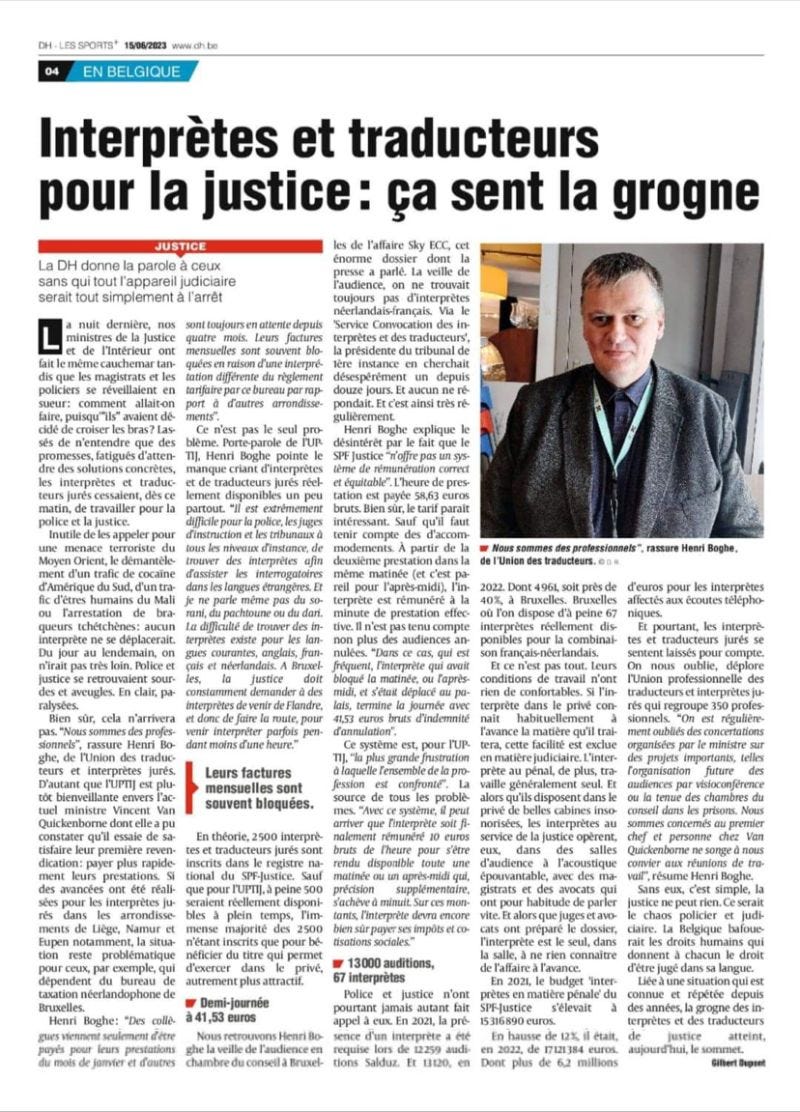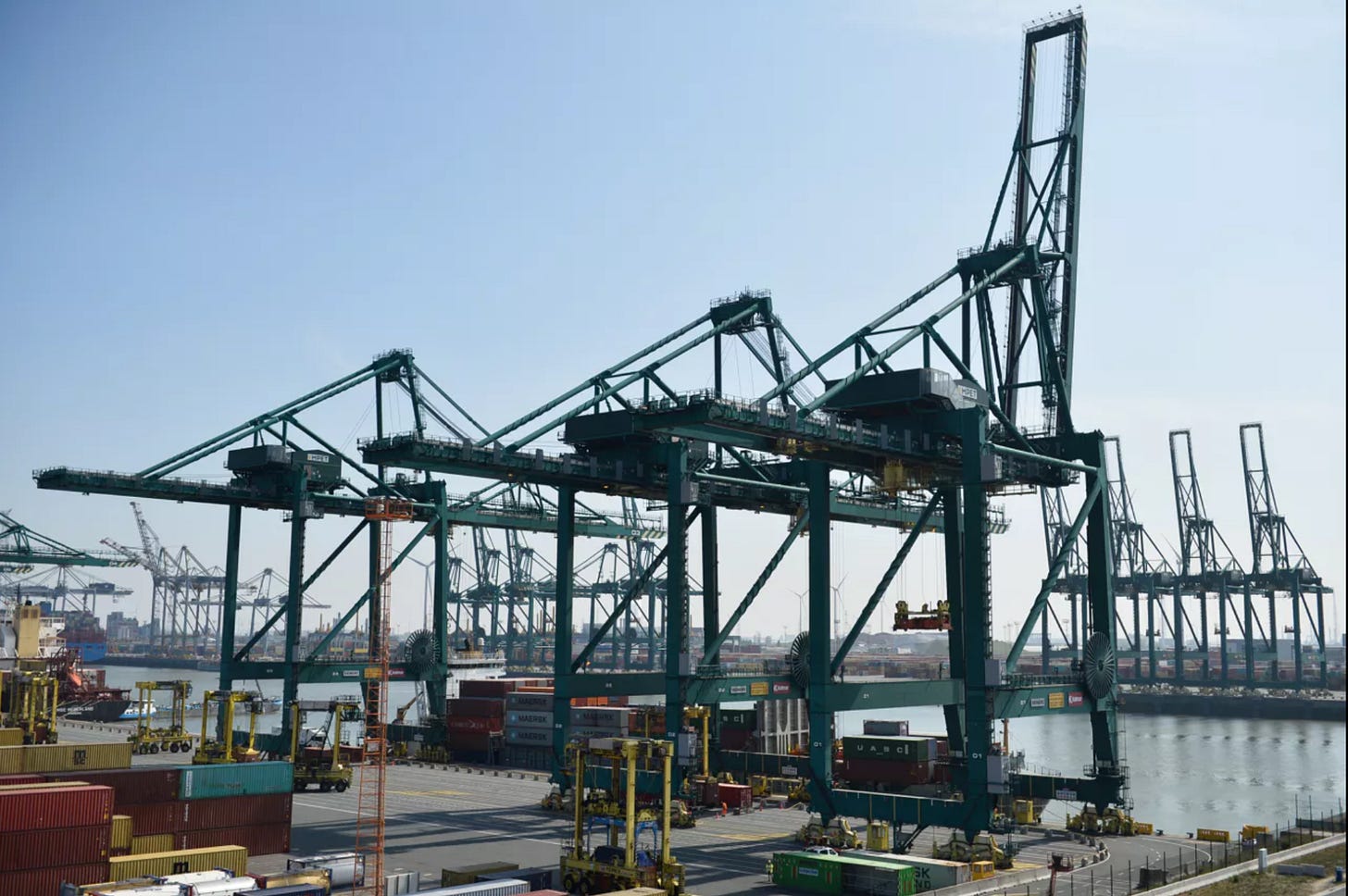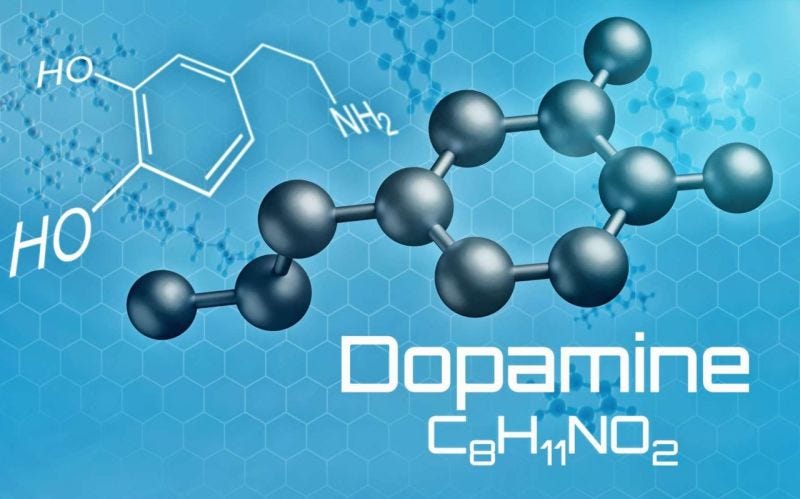Weekending 16 June 2023
TRANSLATION. JUSTICE. HUMAN INTEREST. CIVIL ENGINEERING. DOPAMINE. Six dead good stories
LinkedIn calls its daily résumés wrap-ups, and I like to be a bit original, so I’m migrating to an old BBC Radio 4 programme: this is now Weekending. Crackerjack was on too early for my kind of timing, anyway.
Dead wood
Fellow translator Gilles Plouvier posted an article by another translator, Henri Boghe, who pleads for justice for sworn translators and interpreters, from the Ministry of Justice, no less, who employs them. I chipped in.
I’ve been a translator for the state since 1995. I helped try to extradite General Pinochet. I pursued the murderers of Belgian troops in the Rwanda crisis and wept as I translated witness statements that testified to the horror. I helped bring the Devil’s Couple to justice: a woman and her friend; she married an Englishman and murdered him in a staged accident on their honeymoon on the isle of Corsica. Plus the Brussels bombers of March 2016 (who are now on trial), plus a boy who shot a guy six times and missed — he shot him in the arse; he’s now in prison in Manchester for trying to mow people down with a delivery van. He was jailed age 17 and wasn’t even a good criminal, let alone a good citizen. Belgium’ll get its chance at him when he’s out of Strangeways.
I am a lawyer. I have four law diplomas. Two from Scotland and two from Germany. I’ve worked in-house at three law firms, a Big Four firm of tax advisers and accountants, and a high-street bank. I know Belgian law as well as anyone. Not in the details, but over the whole system. Unlike many Belgian barristers.
I must prove my worth to continue after this coming November. I must give up my work and attend college for a diploma to be allowed to continue. It costs around 2,000 euros, and during the course I cannot earn. Or I must adduce in evidence the fact I worked on the 1990s cases I served on. I disposed of all my paperwork from over ten years ago as of no use. Now I need it. But I don’t have it. I will be 62 by November.
I will then cease to be a sworn translator. All my experience and ability (French-Dutch-German-English, from and into all of them) will be lost to the state. Because the cost of acquiring their diploma is simply not worth the payment I’d get for the work they give.
They pay half what private clients pay, who demand that the job be done right, but have never asked to see any of my qualifications. And now, the state, after nigh-on 30 years, wants one.
Progress. That’s cutting off the old wood to make way for new growth.
Dead right?
According to VRT NWS, “Sky ECC was a company that offered encrypted communication via high-security smartphones. The company professed that the messages sent via Sky ECC could not even be cracked by the police. But, in March 2021, Belgian investigators succeeded. They were able to read the system live for several weeks, and also store a billion messages. Hundreds of convictions have already been handed down on the basis of that information.”
Sky ECC information has now been adduced on appeal to prove the guilt of two men acquitted in 2022 of charges that they headed up a drugs gang. They’ve now been convicted, on the basis of the evidence from Sky ECC that they were indeed two code names used for such communications. Bravo?
Clearing dangerous criminals from the streets of Belgium is no bad thing. As long as due process is observed. Due process is the means by which states prosecute accused according to the rules. But, if the police cracked the Sky ECC system in 2021, and therefore had the information they needed about the two men already in their possession, how come the evidence was not led in 2022, when the men were tried? How come the evidence is only “found” after the acquittal and in time for the appeal hearing? Can an appeal court hear additional evidence for the prosecution? And did it at any time enquire why evidence already in the police’s possession was not adduced at trial and only at appeal?
Whatever may be the case for ridding Belgium of its criminals “at any price”, if the price at which it is ridded of them is an extra, expensive court process, itself the result of sloppy police procedures, the benefit may still be felt to be worth the price. But is it due process?
Click the pic for VRT’s article
And click here for my reaction on The Endless Chain earlier this week:
For how many seasons are you?
Things are hotting up. Mr Trump’s bodyguards are threatening armed resistance in America. And, in Britain, Mr Johnson’s mounting a full frontal attack on those who mounted a full frontal attack on him for mounting a full frontal attack on Covid regulations that he’d introduced to mount a full frontal attack on people who spread viruses.
Honourable dead
The spirit of Captain Lawrence Oates.
Oates was mortal, but his final words immortal. Realising he stood as a barrier to Scott ever having a chance to survive his failed 1912 expedition to the South Pole, he left their quarters with the words “I am just going outside and may be some time.” They all died.
In Colombia, four children and their father have been found alive in the Amazon, 40 days after their aeroplane crashed. Their mother did not survive. She told her husband: “Leave me, and save the children.” Her body has now been discovered in the aircraft.
She deserves sainthood.
A recent article of mine, which mentions Captain Oates:
I am just going outside and may be some time
Captain Lawrence Oates was a hero. On several counts, but for one of which he is most fondly remembered. Injured and proving a burden to the immense task facing the failed Antarctic explorer Robert Falcon Scott, he spoke these words, including an admonition to not come after him, before quitting their hopeless situation and being lost in a blizzard of s…
Dead on arrival?
I’ll tell you what I think, what I really, really think. Thank you, the Spice Girls, for they are my only inspiration at this juncture.
Straight up, I don’t think Mr Trump and I would ever be bedfellows. Nor me and Mr Putin. Nor me and Mr Zelenskiy. None of them is my type. But only one of them has an indictment that is now likely to lead to trial. Neither of the other two does.
What do I think?
I think he’s been indicted.
I think that an indictment might possibly lead to a conviction.
And I believe that an indictment might possibly lead to an acquittal.
And I believe in the presumption of innocence until proof of guilt.
And I don’t give a bird who’s in the dock.
That principle applies in any country that vaunts the rule of law.
And I don’t believe in mob justice.
The identity of the accused is no reason to augment the onus of proof or lower the threshold of the state’s task. Not even, hypothetically, Mr Putin, to be quite frank.
The onus of proof lies on the state to prove guilt beyond a reasonable doubt.
Not to grab headlines in newspapers.
The state will do its job, and, if it does its job properly, it will prove, as it clearly intends to, the guilt for which it has proved probable cause to the grand jury.
The grand jury has given it an arrow for its bow, which it must now, at some great expense to the US taxpayer, aim and successfully shoot.
It has no blunderbuss, but a single shot.
The case, I believe, will be heard in court.
And not in the blogs and newspapers.
That’s what I think.
And that’s what I wish everyone would think who sees justice in “public lynchings by mouse click.”
Dead professional
They’re putting a new bridge across a motorway and things will be a bit chaotic tomorrow in Zaventem (Sunday, 12 June).
The chaos is calculated to be restricted to the surrounding road network, as the motorway is to be closed. But I have a feeling that there will not be any chaos whatsoever on the site, which is in the careful hands of a firm called Sarens. What impresses me about Sarens is the fact you have to really look to find their name on their equipment, which is humungous. It’s the kind of lettering you’d expect on a suitcase: If found, please return to ...
What that broadcasts to me is “We don’t really need to advertise: no gaudy publicity or multi-coloured layout. We’re good, if not the best. And people who need what we do know that.” I don’t think that they’ll do TV spots.
And the conclusion from that is pretty much: companies that do TV spots, I’m not really that interested in. The best pros are those that don’t flash their humungous equipment around. As it is in the Rue d’Aarschot, so is it at the Zaventem interchange.
They say on their website “Nothing too heavy. Nothing too high.” Their English needs tweaking (what they mean is Nothing’S too heavy, Nothing’S too high, and not: we don’t do things that are too heavy or too high).
Should I write and tell them? Na, I reckon they get the business regardless of what it says on their website.
Good luck tomorrow, guys.
Dead exciting
How do managers feel when their workforce do things right?
And how do they feel when workers get reprimanded?
A local shop here sells foreign produce and has recently been ordered by a court to label the entire range of produce in our local language. Some time after the court order, the store was inspected by the food chain regulator.
Now, there were some errors. Still water was translated as if it meant it hasn’t changed from being water. But other errors were found that, all told, were fairly minor, but led to a serious, bold-type-printed reprimand.
So: do you think that store inspectors get a dopamine boost:
- when they find errors? or
- when they find that everything is in order?
What about HR departments and line management? Tax inspectors and policemen? Do people get more satisfaction from finding fault or from finding perfection?
I suggest that those who get a dopamine boost from finding fault are themselves in the wrong position.
Perhaps we should measure dopamine levels before promoting management?
It wouldn’t be beyond possibilities.
And it might make for a better work environment.
This message is brought to you by someone who knows nothing about HR, but a lot about people.









